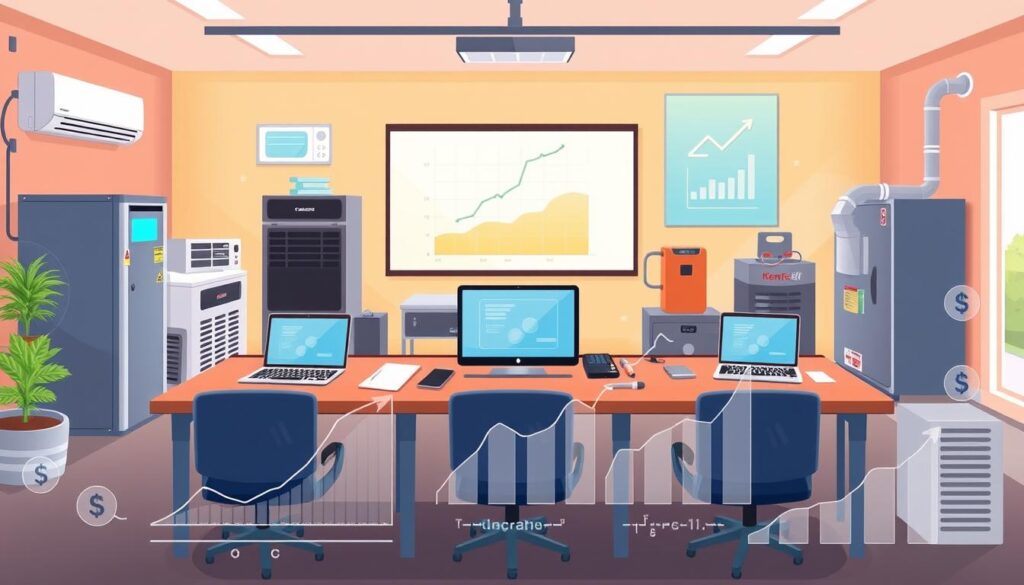Affiliate Disclosure
HVAC Guide Guys is a participant in the Amazon Services LLC Associates Program, an affiliate advertising program designed to provide a means for sites to earn advertising fees by advertising and linking to Amazon.
Can You Go To HVAC School Online? As I sat in my living room, the air conditioning unit’s hum caught my attention. It reminded me of the vital role HVAC technicians play. They keep us comfortable and healthy at home and in businesses everywhere. Now, thanks to online HVAC education, becoming a technician is easier than ever.
Today, juggling work, family, and school is tough. That’s why online HVAC training is so attractive. It offers flexible schedules and lets you learn from home. This way, you can start a new career without giving up your current life.

Key Takeaways
- Online HVAC education offers flexibility and convenience for balancing work and family commitments.
- HVAC programs cover essential topics like HVACR math, theory, communication, tools, safety, and certification preparation.
- Successful completion of online HVAC training, including the EPA Section 608 Certification exam, can enhance job prospects in the industry.
- The HVAC field is projected to experience steady growth, with a 6% increase in job opportunities by 2032.
- Online HVAC programs provide access to digital resources, an active student community, and support to assist in becoming a certified HVAC technician.
Table of Contents
Understanding Online HVAC Education Options
Online HVAC education offers many paths for those wanting to enter this field. You can choose from short courses to full associate degree programs. These options fit different learning styles and career goals.
Types of Online HVAC Programs Available
Online HVAC programs last from 6 months to 2 years. They are flexible and accessible. You’ll learn about HVACR theory, air distribution, and more. Some even prepare you for the EPA 608 Certification exam.
Accreditation and Program Recognition
Choosing an accredited online HVAC program is key. Look for accreditation by the Distance Education Accrediting Commission (DEAC). This ensures your education meets industry standards. Accredited online HVAC courses are valued by employers and open many career doors.
Curriculum Structure and Duration
Online accredited HVAC programs mix theory with practical skills. You’ll study HVAC system design, installation, and repair. Program lengths vary, with some offering associate degrees that include HVAC training and general education.
Explore Our HVAC Shop
Looking for top-rated HVAC tools, parts, and accessories? Visit our shop and find the perfect solution for your needs.
Visit the ShopCan You Go To HVAC School Online: Benefits and Limitations
Online HVAC school offers many benefits. It’s flexible and saves time. Students can learn at their own pace, fitting it into their busy lives.
But, there are challenges too. Online learning lacks hands-on practice. This is key for mastering HVAC skills. Also, missing out on face-to-face learning can make it hard to get help and work with others.
Success in online HVAC programs needs self-discipline. Students must stay motivated and finish their work alone. Some programs might not offer career help or job placement services, which are important.
Online HVAC schools work well for those who like learning at their own pace. But, if you prefer hands-on learning or a more structured schedule, in-person classes might be better. It’s important to choose a program that fits your learning style and career goals.
| Advantages of Online HVAC Schools | Limitations of Online HVAC Schools |
|---|---|
|
|
It’s crucial to think about the pros and cons of online HVAC schools. This helps you decide if it’s right for you. Knowing the challenges and benefits can help you succeed in the HVAC field.
Essential Prerequisites for Online HVAC Training
Starting an online HVAC training program needs a strong base. Knowing the key prerequisites is crucial for a smooth and successful path.
Educational Requirements
You need at least a high school diploma or its equivalent to join an online HVAC program. This basic education helps you grasp the technical aspects of HVAC systems.
Technical Requirements and Equipment
You’ll need a dependable computer and a steady internet connection for online learning. Basic computer skills, like browsing the web and managing files, are also vital.
Time Commitment Expectations
Completing an online HVAC program requires a lot of time. The time needed varies based on the program’s depth and your learning speed. Some programs are quicker, while others are more flexible.
| Program Fee | $2,895 |
|---|---|
| Installment Payment | As low as $141 per month |
| Program Format | 330 hours of online instruction, self-paced over 12 months |
| Employment Outlook | HVAC/R technicians job growth expected at 13%, adding 46,300 new jobs |
| Average Salary | Just under $49,000 per year, with top earners making nearly $78,000 |
| Certification Exams | Receive voucher package for HVAC Excellence Employment Ready Certificate exam, including 1 Employment Ready Certificate for Electrical, 1 Employment Ready Certificate for Air Conditioning, and 1 EPA 608 Voucher |
Understanding these prerequisites helps you prepare well for your online HVAC training. It sets you up for success in the HVAC field.
Explore Our HVAC Shop
Looking for top-rated HVAC tools, parts, and accessories? Visit our shop and find the perfect solution for your needs.
Visit the ShopCost Analysis of Online HVAC Certification
Starting an online HVAC certification journey is a wise and affordable choice. The cost for these programs usually falls between $1,000 to $3,000. But, remember, the total cost includes more than just program fees. You’ll also need to pay for books, training materials ($200-$500), and exam fees (around $200).
Many online HVAC programs cover the cost of materials in the tuition. This makes the overall cost easier to manage. Plus, students can find financial help like federal grants, scholarships, and loans. These options can help reduce the HVAC certification costs and online HVAC program fees.
| Expense Category | Estimated Cost Range |
|---|---|
| Tuition for Online HVAC Programs | $1,000 – $3,000 |
| Books and Training Materials | $200 – $500 |
| Examination Fees | Around $200 |
| Financial Aid Options | Grants, Scholarships, Loans, Work-Study |
By looking at all the costs and aid options, students can make smart choices. This way, they can get their HVAC certification online without breaking the bank.

Explore Our HVAC Shop
Looking for top-rated HVAC tools, parts, and accessories? Visit our shop and find the perfect solution for your needs.
Visit the ShopOnline vs Traditional HVAC Training Programs
Prospective students have a choice between online and traditional HVAC training. Each has its own benefits and drawbacks to consider.
Learning Methods Comparison
Online HVAC programs let you learn at your own pace from home. But, they might not offer the hands-on experience that classroom programs do. Practical training is key in HVAC to enhance your skills.
Hands-on Experience Opportunities
Traditional HVAC training gives more hands-on time. This lets students work directly with HVAC equipment and installations. It’s a big plus over online courses, which can’t match real-world training.
Success Rates and Job Placement
Both online and traditional programs can lead to good careers in HVAC. But, the program’s quality and your effort matter a lot. Online students might find it hard to stay motivated and manage their time.
Choosing between online and traditional training depends on your learning style and goals. Look at the program’s curriculum, hands-on training, and job placement rates. This will help you decide what’s best for you.
“Hands-on training is considered crucial in the HVAC industry to complement theoretical knowledge for better skills development.”
State Licensing Requirements and Online Training
HVAC licensing rules change a lot from state to state. In California, for example, you need to finish an approved training program. You also need 2 years (or 3,000 hours) of real-world experience and pass a big exam. Online HVAC training must meet these state standards to prepare students well.
In Florida, HVAC apprentices must get a license to work alone. They need to finish a certain number of training hours, pass an exam, and get a state permit. Luckily, many of these requirements can be met with online courses. This helps HVAC pros keep their licenses and learn new skills.
“The ability to complete HVAC training and licensing requirements online has been a game-changer for many aspiring technicians. It provides the flexibility and convenience they need to pursue their career goals without disrupting their daily lives.”
It’s key to check the HVAC licensing and state-specific HVAC requirements in your area before starting online HVAC training. This makes sure you’re on the right path to becoming a licensed HVAC pro. You’ll be ready to do great things in the field.
Career Prospects After Online HVAC Certification
Thinking about an online HVAC training program? The career outlook for HVAC technicians is bright. The Bureau of Labor Statistics predicts a 5% growth by 2033, outpacing most jobs.
Job Market Overview
The HVAC industry is booming, with over 441,200 jobs available across the country. These jobs are in homes, businesses, and factories. This means many career paths for skilled HVAC technicians.
Salary Expectations
HVAC technicians earn a median of $53,920 a year. But, top earners make over $76,230. Starting jobs and apprenticeships can lead to better pay as you gain experience.
Growth Potential
The HVAC field offers great chances for growth. Getting special certifications, like the EPA Section 608, can lead to higher-paying jobs. These include HVAC project management and engineering roles.
Online HVAC training sets you up for a fulfilling career. With the right skills and ongoing learning, you’ll find many opportunities for advancement and financial success.
“The HVAC industry is rapidly evolving, and skilled technicians who stay up-to-date with the latest technologies and best practices will be in high demand.” – Industry Expert
Explore Our HVAC Shop
Looking for top-rated HVAC tools, parts, and accessories? Visit our shop and find the perfect solution for your needs.
Visit the ShopPractical Skills Development in Virtual Learning
Aspiring HVAC technicians can now get hands-on experience through HVAC practical training online and virtual HVAC skill development programs. These courses use advanced simulations and virtual labs. They offer interactive, real-world training without the need for a physical classroom.
Many programs use augmented reality (AR) technology. This lets students see and interact with HVAC components in a virtual world. It’s a way to practice skills like equipment installation, troubleshooting, and maintenance safely.
Some online HVAC programs also include internships or apprenticeships. These hands-on experiences let students apply what they’ve learned. They work under the guidance of experienced HVAC professionals.
Students can also improve their skills through self-study. They can use technical manuals, video tutorials, and online resources. This mix of virtual training and hands-on experience helps students become well-rounded in the HVAC industry.
| Metric | Value |
|---|---|
| Average HVAC/R Technician Salary (US) | $57,000 per year |
| Median HVAC/R Technician Salary (California) | $62,000 per year |
| California HVAC/R Technician Employment Rank | 2nd in the US |
Online HVAC programs are changing how technicians learn. They use technology to prepare students for the industry’s demands. This approach boosts students’ confidence and competence.

EPA Certification and Online Training Integration
Getting the EPA 608 Certification is key for HVAC pros. It’s needed for those handling equipment that could leak refrigerants. Luckily, many online HVAC courses now include EPA prep, making it easier to get certified.
The Training Center offers an Online EPA HVAC Training. It includes a 2-hour live webinar, study materials, quizzes, and a final exam. You can pick live dates or On-Demand access. The $300 fee covers everything you need to pass the EPA 608 exam.
The course covers Types I, II, and III appliances. Since 2011, the Training Center has been EPA-approved. You can take the exam online with a proctor. After passing, you’ll get your results and ID card by mail.
| EPA 608 Certification Details | Provided by Training Center |
|---|---|
| Course Fee | $300 |
| Exam Format | Online proctored exam |
| Exam Attempts | Unlimited |
| Appliance Types Covered | Type I, Type II, Type III |
| EPA Approval | Since February 23, 2011 |
| Certification Transfer | National, allowing transfer between states |
By adding EPA 608 Certification to their online courses, places like the Training Center help HVAC pros. With the right training and certification, you’re on your way to a great HVAC career.
Conclusion
Online HVAC schools provide a flexible way to get certified in HVAC. They are perfect for those who learn best on their own. These programs last from 6 months to 2 years and cover a lot of HVAC topics.
They include system basics, installation, and maintenance. You’ll also learn about energy efficiency, regulations, and how to serve customers well. Even though you won’t get as much hands-on experience online, it’s a great start to your HVAC career.
Your success in an online HVAC program depends on your hard work and the program’s quality. You also need to get practical experience to really learn. The need for skilled HVAC workers is growing fast.
This is because climate control and energy efficiency are becoming more important. So, those who finish these programs will have lots of chances to grow in their HVAC career preparation. They’ll also help the HVAC online education benefits grow.
If you want a flexible way to get into HVAC or to improve your skills, online schools are a good choice. With the right program and effort, you can start a rewarding career in HVAC.
FAQ
What types of online HVAC programs are available?
What accreditation and program recognition should I look for in an online HVAC school?
What are the benefits and limitations of online HVAC training?
What are the educational and technical requirements for online HVAC training?
How much does online HVAC certification cost?
What types of online HVAC programs are available?
What accreditation and program recognition should I look for in an online HVAC school?
What are the benefits and limitations of online HVAC training?
What are the educational and technical requirements for online HVAC training?
How much does online HVAC certification cost?
FAQ
What types of online HVAC programs are available?
Online HVAC programs last from 6 months to 2 years. They teach HVACR theory, air distribution, and more. Some include EPA 608 Certification exam prep. Associate degrees in HVAC are also online, mixing HVAC training with general education.
What accreditation and program recognition should I look for in an online HVAC school?
Look for accreditation by the Distance Education Accrediting Commission. This ensures quality and recognition. Programs must meet state standards, and some states require additional licenses.
What are the benefits and limitations of online HVAC training?
Online HVAC training is flexible and saves time. But, it lacks hands-on practice and face-to-face interaction. Success requires self-discipline and a good learning environment.
What are the educational and technical requirements for online HVAC training?
You need a high school diploma or equivalent and basic computer skills. Prior HVAC experience is helpful but not required. You’ll need a computer and internet to study.
How much does online HVAC certification cost?
Online HVAC programs cost between
FAQ
What types of online HVAC programs are available?
Online HVAC programs last from 6 months to 2 years. They teach HVACR theory, air distribution, and more. Some include EPA 608 Certification exam prep. Associate degrees in HVAC are also online, mixing HVAC training with general education.
What accreditation and program recognition should I look for in an online HVAC school?
Look for accreditation by the Distance Education Accrediting Commission. This ensures quality and recognition. Programs must meet state standards, and some states require additional licenses.
What are the benefits and limitations of online HVAC training?
Online HVAC training is flexible and saves time. But, it lacks hands-on practice and face-to-face interaction. Success requires self-discipline and a good learning environment.
What are the educational and technical requirements for online HVAC training?
You need a high school diploma or equivalent and basic computer skills. Prior HVAC experience is helpful but not required. You’ll need a computer and internet to study.
How much does online HVAC certification cost?
Online HVAC programs cost between $1,000 and $3,000. You’ll also pay for books, training materials, and exam fees. Some programs include these costs in the tuition, and financial aid is available.
How do online HVAC programs compare to traditional HVAC training?
Online programs are flexible but lack hands-on experience. Traditional programs offer more practical training. Both cover important HVAC topics, and job opportunities are promising, especially in California.
What are the state licensing requirements for HVAC technicians, and how do online programs fit in?
Licensing rules vary by state. Online programs must meet these standards. For example, California requires an accredited program, practical experience, and a certification exam. Continuing education for renewal can be done online.
What are the career prospects for HVAC technicians after completing online certification?
HVAC technician jobs are growing 5% by 2033, with a median salary of $53,920. Top roles include HVAC project managers and engineers. Opportunities are in residential, commercial, and industrial sectors, with a master license for the most work.
How do online HVAC programs facilitate practical skills development?
Online programs use simulations and virtual labs for training. Some include augmented reality for hands-on experience. Internships or apprenticeships may be needed, and self-study can also improve skills.
How are EPA 608 Certification requirements integrated into online HVAC training?
EPA 608 Certification is key for refrigerant handling. Many online programs prepare for this exam. The exam fee is around $200, but some programs offer it for $10. EPA certification is vital for HVAC and HVACR work.
,000 and ,000. You’ll also pay for books, training materials, and exam fees. Some programs include these costs in the tuition, and financial aid is available.
How do online HVAC programs compare to traditional HVAC training?
Online programs are flexible but lack hands-on experience. Traditional programs offer more practical training. Both cover important HVAC topics, and job opportunities are promising, especially in California.
What are the state licensing requirements for HVAC technicians, and how do online programs fit in?
Licensing rules vary by state. Online programs must meet these standards. For example, California requires an accredited program, practical experience, and a certification exam. Continuing education for renewal can be done online.
What are the career prospects for HVAC technicians after completing online certification?
HVAC technician jobs are growing 5% by 2033, with a median salary of ,920. Top roles include HVAC project managers and engineers. Opportunities are in residential, commercial, and industrial sectors, with a master license for the most work.
How do online HVAC programs facilitate practical skills development?
Online programs use simulations and virtual labs for training. Some include augmented reality for hands-on experience. Internships or apprenticeships may be needed, and self-study can also improve skills.
How are EPA 608 Certification requirements integrated into online HVAC training?
EPA 608 Certification is key for refrigerant handling. Many online programs prepare for this exam. The exam fee is around 0, but some programs offer it for . EPA certification is vital for HVAC and HVACR work.

